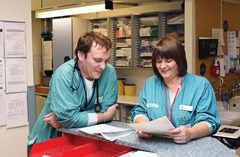Progress in acute services
 The expansion of cardiac cath labs is one of the signs of improvement for acute services as the reform programme moves ahead.
The expansion of cardiac cath labs is one of the signs of improvement for acute services as the reform programme moves ahead.
The shift in services from hospitals to community settings is one of the major changes being implemented by Transforming Your Care. However, the health reform programme is also changing how services within hospitals operate.
Asked by agendaNi to explain the changes in acute services over the last six months, the Health and Social Care Board highlighted increased access to ‘cath labs’ for cardiac arrest patients, an urgent assessment unit for surgical patients at the Royal Victoria Hospital, and the recruitment of extra orthopaedic staff.
The first example has involved a £1.9 million investment by the Belfast Health and Social Care Trust and Western Health and Social Care Trust in the 2012-2013 financial year. The process (percutaneous coronary intervention) takes patients who are having a heart attack to a catheterisation laboratory centre. A balloon catheter is inserted and used to relieve the blockage.
This investment has increased the number of cath lab sessions in Northern Ireland from 78 to 93, and further progress is expected over the rest of this financial year. Ideally, this service should be available to all patients who need it at any point in time.
The Royal’s new six-bed surgical assessment unit is located within its emergency surgical unit. This provides a dedicated, centralised area where acutely ill surgical patients can be assessed and monitored and an appropriate management plan can be put in place.
Over the coming year, the extra funding for orthopaedic medicine will be used to recruit new consultants, to allow practitioners to focus on specialist interests and to make preparations for a regional podiatric foot and ankle surgical service.
The Department of Health, Social Services and Public Safety has also started a review of options for managing Causeway Hospital, in Coleraine, as recommended in TYC’s post-consultation report. This is likely to include more networking with Altnagelvin Area Hospital in Derry.
Pressures on Antrim Area Hospital’s A&E unit (including regular breaches of the four-hour waiting times) has dominated media coverage of acute care over the last year. The Northern Health and Social Care Trust hopes that the £14.2 million new A&E unit, which opened in June, will help to relieve pressure. The trust has also emphasised that people should not visit A&E unless a genuine emergency is taking place; many minor services can be provided by GPs or other non-acute healthcare staff.
The Transforming Your Care review recommended that the number of acute hospitals should be gradually reduced from 10 to five, six or seven. This transition, and the accompanying transfer of out-patient and diagnostic services into the community, should take “full account” of the department’s service frameworks and clinical pathways for various medical conditions.





